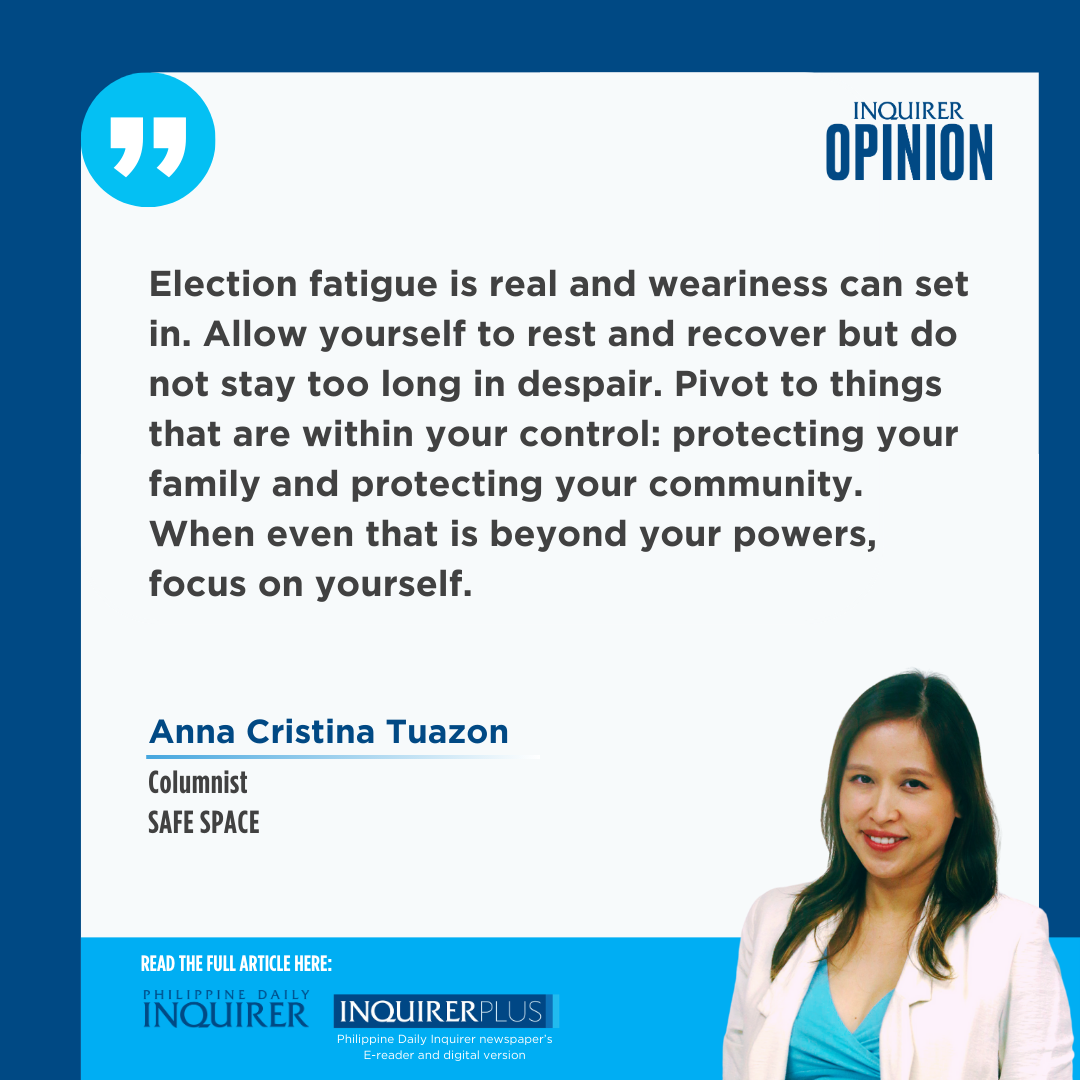Election weary
As I write this, the United States elections are still too close to call, though today’s headline would probably be more conclusive. As Donald Trump vies once again for the highest seat in arguably the most powerful country in the world, I am brought back to 2016 when he battled Hillary Clinton and emerged as victor. At that time, I was full of hope—and, in hindsight, overconfidence—that the US will soon have their first woman president. Surely, people will not vote for a foulmouthed, braggadocious individual known for his ruthless ways in business? This is the same person, after all, who claimed that he could kill someone in public (on 5th Avenue in New York, specifically) and get away with it. But that heady anticipation of a historic win turned to despair as Trump was sworn in, the hard reality sinking in that my political views are not reflected by the majority. Remember that this was not long after former president Rodrigo Duterte also won, part of a global swing toward authoritarianism and populist leaders. A political minority in my country, also a political minority in the world.
I had an eerie sense of déjà vu during our own 2022 presidential elections when former vice president Leni Robredo’s campaign inspired much passion and made people hope once again. People seemed fully convinced at the time of her win due to the massive crowds that were gathering in her rallies. I was already wary, remembering my political heartbreak in 2016, and braced myself for the outcome. The sea of red shirts in my polling precinct certainly didn’t allay my fears. Surely enough, when the Marcoses returned to Malacañang, I had to support youth clients who experienced political despair for the first time, not yet having experienced that life perseveres regardless of any election outcome.
There are many ways to react to an election. One way—and I hope that we are never too jaded to do this—is to actively engage whether as a candidate, volunteer, or as a participant in political conversations. Participating in the election process helps us feel that we have some control over our collective future and that our voices, no matter how small, matter.
The opposite is to feel disenfranchised. There is, of course, actual disenfranchisement where people are legally deprived of the right to vote or to participate formally in political activities. However, what we are seeing is that despite the technical right to vote, a lot of people still feel disenfranchised in the sense that they strongly believe that their votes do not matter. A lot of Filipinos seem to feel this way. It doesn’t matter who sits in Malacañang since their lives won’t change anyway. There is a cynicism that’s rooted in the dirty reality of our politics. Vote-buying is an open secret in a lot of towns and barangays. Political dynasties are so longstanding that people would rather continue with the familiar over the untested. People haven’t had much experience in positive political change and so it isn’t at the top of their priorities.
A lot of people react to elections with stress and anxiety. This is a sign that they care about what happens. There is hope, yes, but also the dread of what’s to come if the election doesn’t turn to their favor. When this happens, anxiety turns to despair.
Elections matter. But it’s important to remember that they’re not the only political process or avenue in which we can participate in the fate of our nation. Our elections happen every three years, with presidential elections happening once in six years. The years in between also matter. What we do in between elections help shape our political landscape. As we disparage politicians who only show up during election season, I also caution us from being seasonal citizens. There are many ways to make our voices heard. Retreating into a silent majority only helps the powerful and keeps the status quo.
Participate in your local politics. It starts at the barangays and in homeowners’ associations. Just because we have “leaders” does not mean we have to be passive followers. Safeguard rights and principles via sensible rules and policies. Do not be afraid to be a dissident voice when needed.
Connect with your community. Get to know your neighbors. Pool together interests and resources. Cultivate a sense of bayanihan and be considerate of each other. When we know one another and start caring for each other, then no one will be invisible or left behind.
Election fatigue is real and weariness can set in. Allow yourself to rest and recover but do not stay too long in despair. Pivot to things that are within your control: protecting your family and protecting your community. When even that is beyond your powers, focus on yourself. By the time our May 2025 elections come around, you’ll be glad you shored up your inner resources. In an ideal world, politics is simply a way to address collective interests. Let’s not lose sight of what truly matters.
—————-
aatuazon@up.edu.ph





















